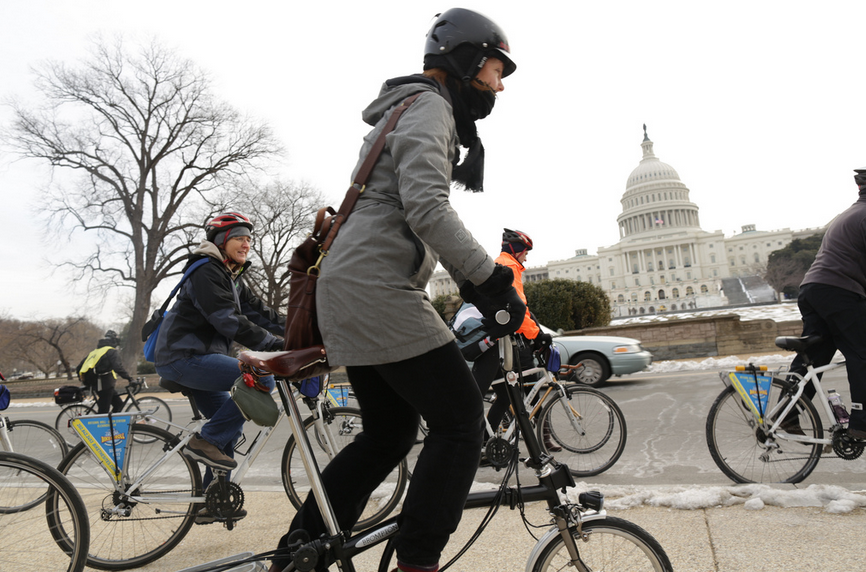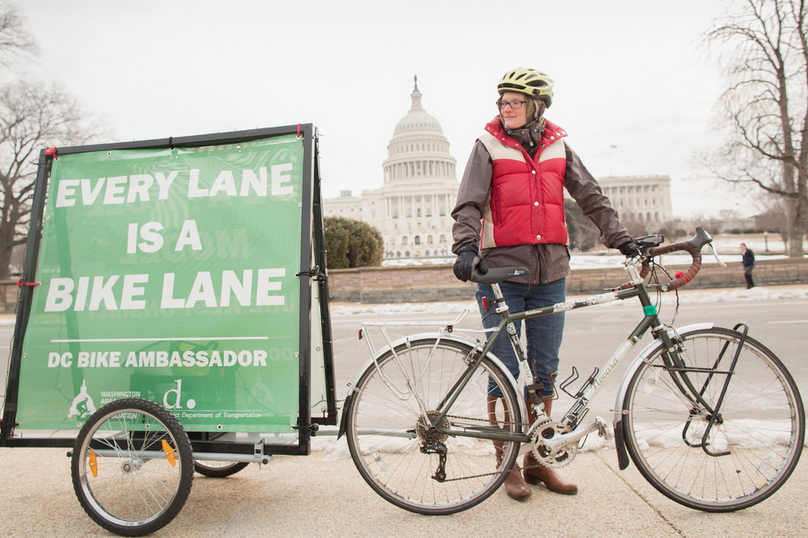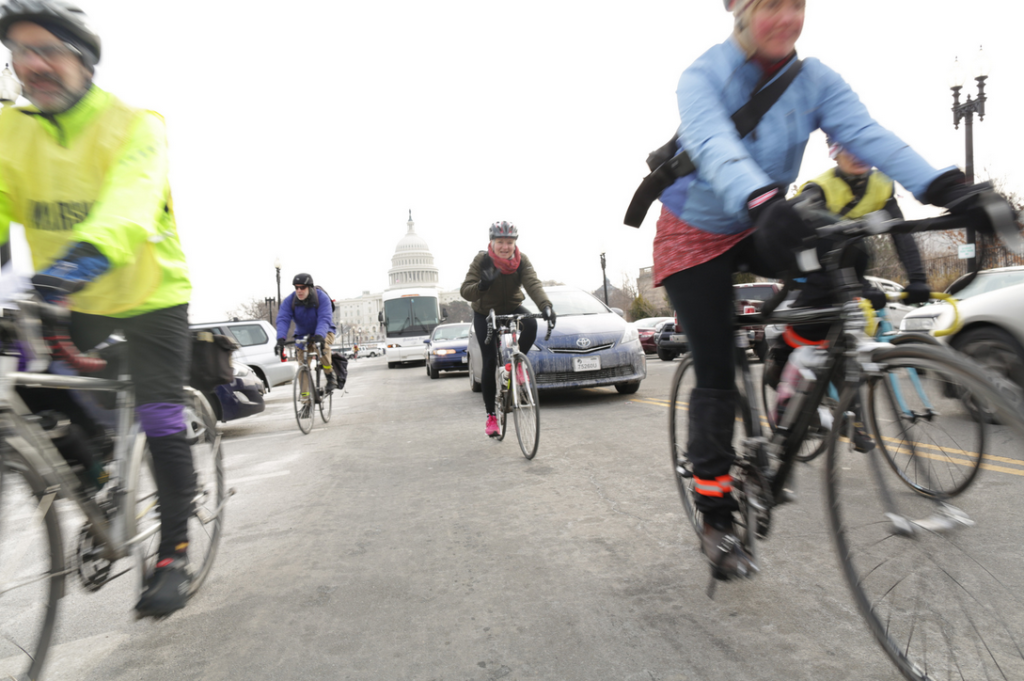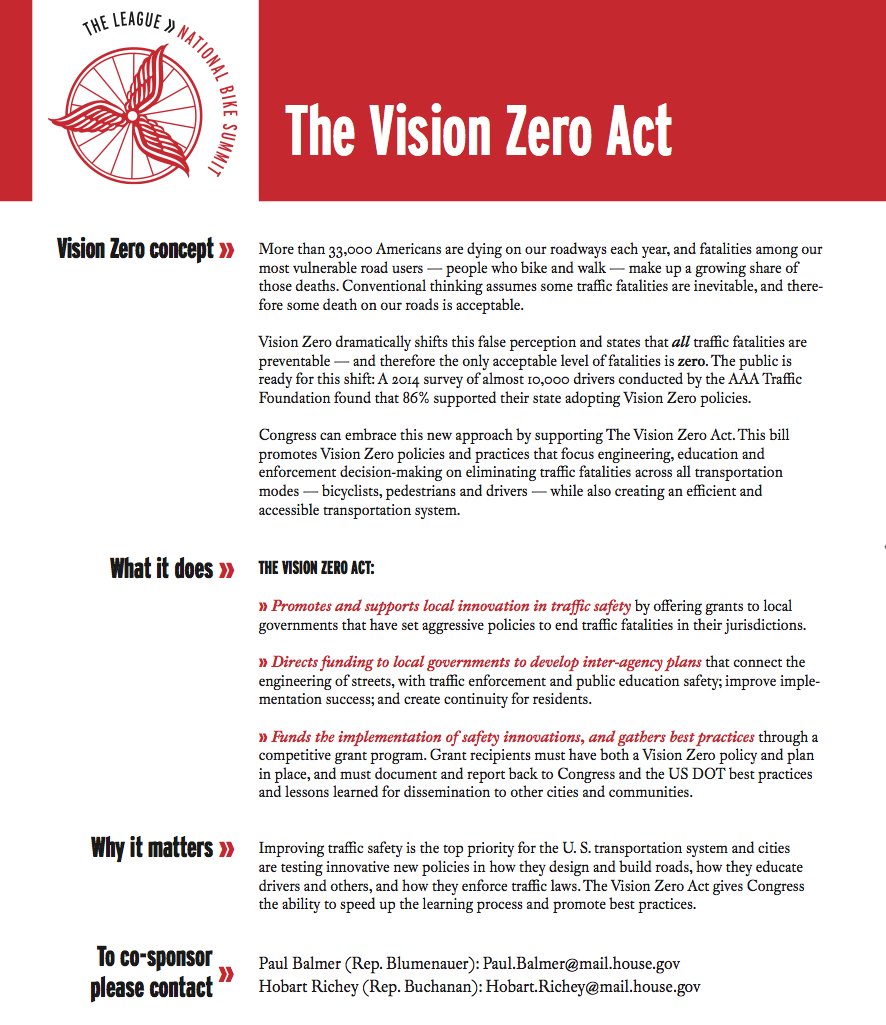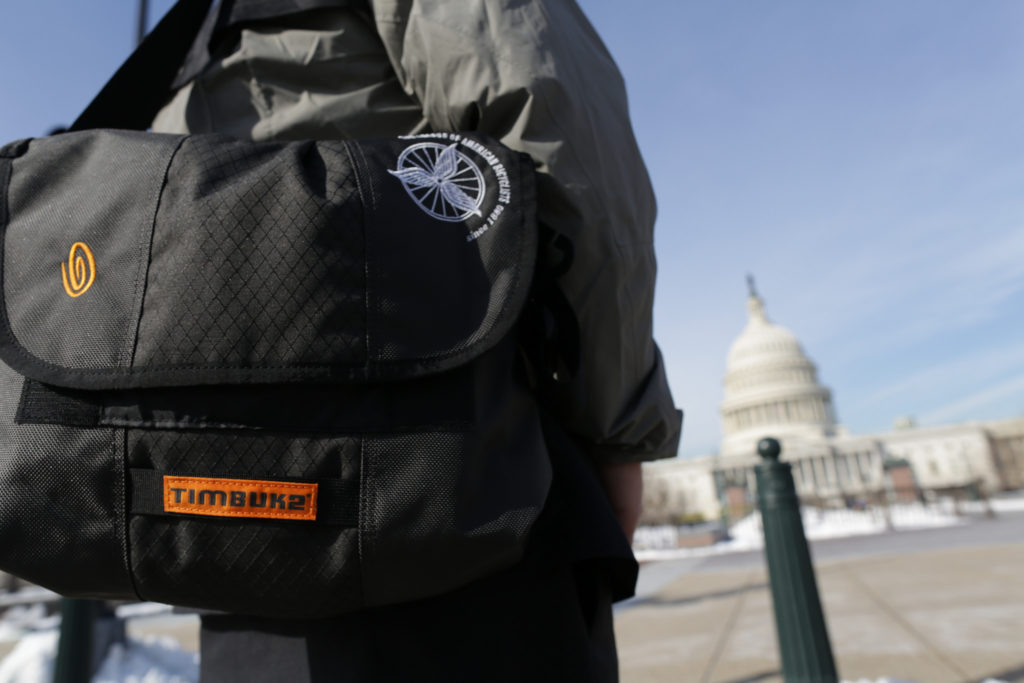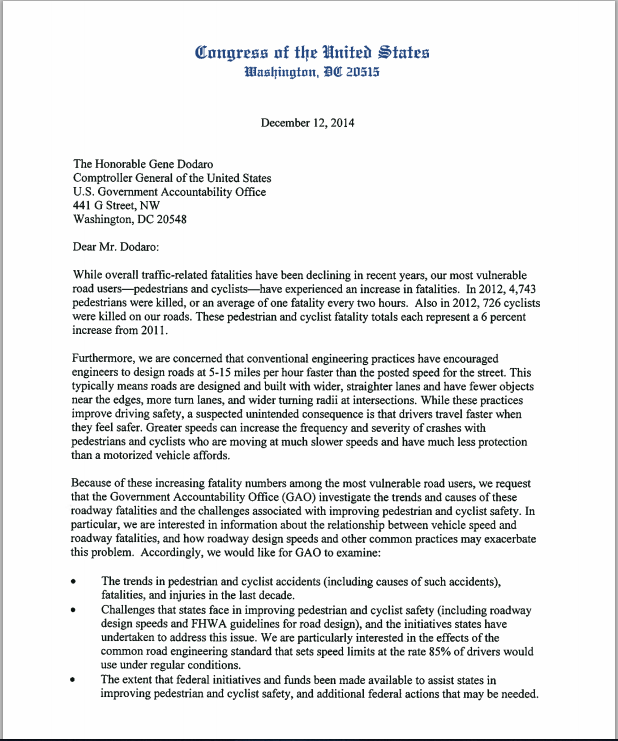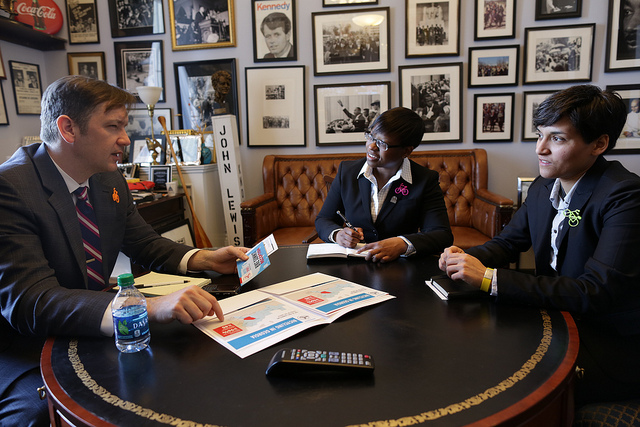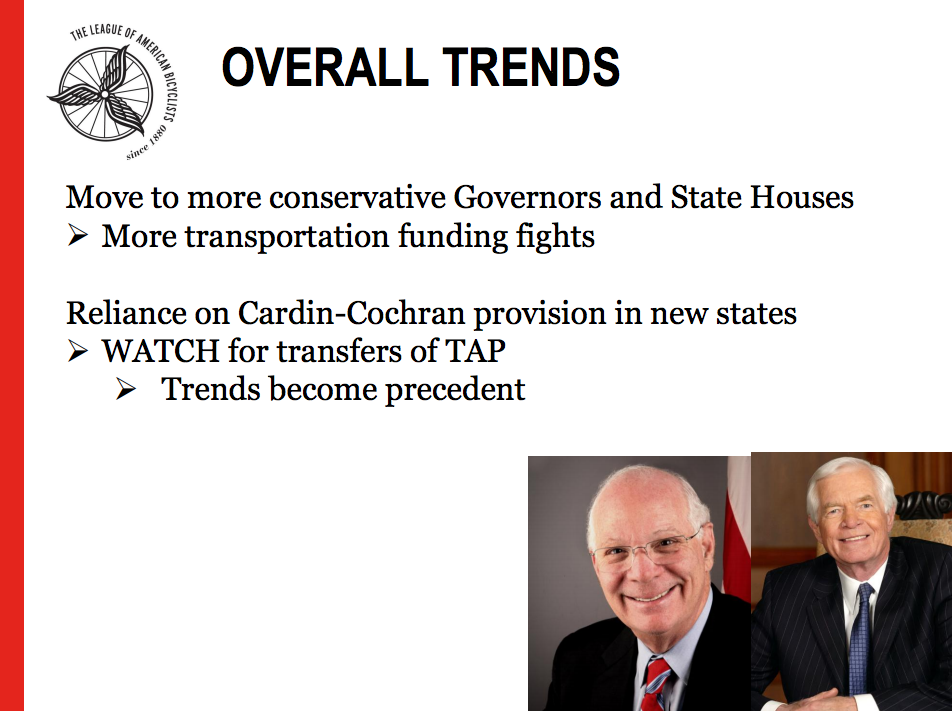Posts by Caron Whitaker
DRIVE Act Gets A Tune-up
This morning the Senate Environment and Public Works Committee met to debate and discuss the DRIVE Act, the Senate’s proposed transportation bill. The hearing today was a feel-good show of bi-partisan support and compromise for a long term transportation bill. The Committee rightly congratulated its leaders (Sens. Jim Inhofe, Barbara Boxer, David Vitter and Tom Carper) for moving the conversation forward on the need for a long term and sustainable transportation bill. While the Committee discussion today was uneventful, it marked the end of a whirl of activity for the Committee members in terms of amendments to the bill — some of which improve the bill significantly from a biking standpoint. Roughly 30 amendments we filed on Tuesday, and a few key ones were passed through by the committee leadership and the committee as a whole. Read our analysis of the original bill here. Here are the new changes that are good for biking.
Read MoreAnalysis: DRIVE Act
As is evident in the acronym, The Developing a Reliable and Innovative Vision for the Economy Act, or DRIVE Act, is not focused on improving multi-modal transportation but rather on the interstate and highway system. The U.S. Senate introduced its version of the new transportation bill this week and it is set for a hearing on Wednesday. While we were successful in getting some small changes to the Transportation Alternative Program (TAP), we do not see any real innovation or vision to really grapple with transportation needs of this 21st Century.
Read MoreHouse Votes to Extend MAP-21
The U.S. House of Representatives passed a two month extension to the federal transportation bill, MAP-21, yesterday, with a vote of 387 to 35. You can read more about the debate over federal transportation funding here. The most interesting part of yesterday’s debate was the number of members of Congress saying they’d had enough: This is the last time they will vote for an extension. Though key Democrats, Minority Whip Steny Hoyer (D-MD) and Rep. Peter DeFazio (D-OR), Ranking Democrat on the Transportation Committee, left some wiggle room for their votes, this could be a threat enough members stand behind.
Read MoreA Fight for the Future
Where did your city get the money for the bike lane on Main Street or the PSA campaign to educate motorists about the rights of bicyclists? It very well could have come from the federal transportation bill. And that funding is running out. The federal transportation bill is the source of a hundreds of millions of dollars that municipal, county and state governments use for biking and walking projects in their communities. Where do those federal dollars come from? The Highway Trust Fund, which relies predominantly on the federal gas tax. But the Trust Fund is in trouble. We’ve been spending more than we’ve been bringing in.
Read MoreSummit: Legislative Asks
The National Bike Summit unites the voices of bike advocates on Capitol Hill, highlighting critical issues and creating relationships with members of Congress that have a direct impact on biking in your community. And we know the Summit gets results: Last year, we pushed for Congress to tell the U.S. Department of Transportation to set a national goal to reduce bicyclist fatalities. Before the end of 2014, they did exactly that. We won, thanks to hundreds of participants at the National Bike Summit.
Read MoreFighting Inequality Through Policy
We’re excited to announce the featured speaker at the opening plenary of the 2015 National Bike Summit: Maya Rockeymoore, the President of Center for Global Policy Solutions and director of Leadership for Healthy Communities, a national program of the Robert Wood Johnson Foundation. Rockeymoore is an expert in equity in policy, specifically in health care. As a part of her responsibilities as director of Leadership for Healthy Communities, Rockeymoore is dedicated to helping state and local elected and appointed officials advance policies that support healthy eating, active living, and childhood obesity prevention. At the Summit, Rockeymoore will be discussing targeted universalism in policy and how that relates to transportation equity.
Read More2014 Recap: Biking & Federal Policy
We’re ending 2014 with a big win for bicycling: a national goal to reduce bicyclist and pedestrian fatalities — an effort we’ve been championing for two years. Success in Washington is rarely immediate, as evidenced in this most recent development. It’s best measured in small milestones, as well as in the big wins. With that in mind, there are a number of milestones that we hope to build on in the 114th Congress.
Read MoreThe Next Step for Safety
We’ve talked a lot about the increase in bicycling and pedestrian fatalities over the last year, but we’ve never really had an answer as to why. Rep. Rick Larsen of Washington State wants to know what the causes are, and what current transportation design and policy practices might be contributing. And when Members of Congress have a question like that, they turn to the Government Accounting Office to answer it. The U.S. Government Accountability Office (GAO) is an independent, nonpartisan agency that works for Congress. Often called the “congressional watchdog,” GAO studies are considered non-partisan and thorough. Congress often uses these reports as a basis for legislative and policy change.
Read More2014 Summit Victory- Join us in 2015!
During the 2014 National Bike Summit, we asked members of Congress to support a national goal to reduce bicyclist and pedestrian fatalities. And this weekend, we got it. That’s the power of face-to-face meetings with members AND their staff — and that’s why we need you at the 2015 Summit this March.
Read MoreElection Analysis: What’s Next for Biking?
The Nov. 4 midterm election saw a major shake up in Congress — and there are still several local, state and federal run-off elections looming in its wake. Earlier this month, I discussed what these results mean for biking at the state and federal levels. So what’s next? Here are the key takeaways from this month’s elections — and what to watch for in the next several months.
Read More